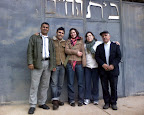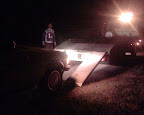train ride from hell
Morning in Asilah was beautiful. We arranged the taxi the night before, so we woke up early to take advantage of the town's sights--snapping pictures of the famous murals and doting on all the cats Morocco is famous for (in my mind, anyway). We bought a few paintings we had been eyeing the previous night—fumbling, rushing to get the canvases off their frames, worrying about damaging the rather-dry paint. Our taxi driver hunted us down, an easy feat in this tiny medina, silent as it is early in the morning. We finally rolled up the paintings and skedaddled. Lots of tranquillos (they speak more Spanish than French in these parts) were thrown about, urging me to take my time, to chill out—maybe if I’d had a puff of what he was on…
The driver was of course a bit dérangé (I love this French word for angry; deranged is so much more colorful than angry) when I told him of my plans to get off in Rabat. He argued I should pay him extra, that it was out of the way (it’s right on the way), I argued tranquillo—there are always bigger fish to fry.
After stopping at the police station to get the proper authorization to drive us to Casa, we were on our way, doing a cool 80kph (50mph) the whole way—annoying when you base your math on faster, saner speeds. Still, we had budgeted plenty of time, so tranquillos we remained. At least until I motioned to my next detour—I had originally planned a short stop at some “exotic” gardens along the way, but we were clearly short of time for that now; instead, I was just hoping for something more scenic than the main route. The driver pretty much freaked out, worrying the police would nab him for deviating from his route, whining about extra time spent on country roads and driving through towns. My mom joined him, questioning whether they’d make their flight. I could not blame him, but still, tranquillo he was once we got back onto a speedier road.
Like in Europe, every region of Morocco has its particular indigenous foods you can buy from peasant peddlers on the roadside: I’ve seen peas, favas, cheese, honey, and argan oil. Today was something new: balls of dirt. I was intrigued when our driver raved about them, but he could not come up with any words outside of his native Arabic: turfa. We stopped and talked to one of the peddlers, rinsing off a dirt ball to reveal an irregular cream-colored core. He took a bite out of it, proclaimed it worthy. I finally understood the gesture he kept making—he was miming eggs, as in cracking them into a bowl. Everything clicked for me: we had stumbled upon indigenous Moroccan truffles. I never think to associate Arabic with romance languages, but sometimes a truffe becomes a turfa. They were mild and bland, but ripe enough. Besides, the novelty killed me: I bought a kilo for $5.
Too many tranquillos later, I was dropped off at a train station near Rabat, to have just missed a train. They were sold out of first class (reserved seats) tickets for the next train, so I slummed it and bought a second-class ticket I would never need. I sat around waiting for the next train, which ran an hour late, and was packed chock-full thanks to the holiday weekend (the Prophet Mohammed’s birth). So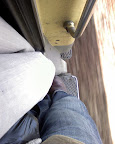 packed, in fact, I couldn’t even get onto the train. I sprinted the 200 yards to the opposite end of the train, seeing less people crowded around the doors. Panicking as the conductor started to give the all-set signal, I seized upon a favorite adage: there is always room for one more. And there was, except for that I was holding on for dear life until two stations and 45 minutes later, when I finally got inside the door…
packed, in fact, I couldn’t even get onto the train. I sprinted the 200 yards to the opposite end of the train, seeing less people crowded around the doors. Panicking as the conductor started to give the all-set signal, I seized upon a favorite adage: there is always room for one more. And there was, except for that I was holding on for dear life until two stations and 45 minutes later, when I finally got inside the door…
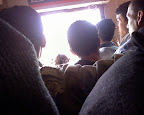 I had already earned the respect of the guys whose rear ends I had become familiar with—we were fast friends. I made it home five sweaty hours later, looking forward to a poker game. The train ride had my cards in a funk, though: I lost all 100 dirhams ($12). I’d later hear from the family that the driver was even more obnoxiously tranquilloing them after I left and, in a final gesture of helpfulness, squeezed the roll of paintings hard enough to cause damage. Tranquillo, he insisted to Shiri.
I had already earned the respect of the guys whose rear ends I had become familiar with—we were fast friends. I made it home five sweaty hours later, looking forward to a poker game. The train ride had my cards in a funk, though: I lost all 100 dirhams ($12). I’d later hear from the family that the driver was even more obnoxiously tranquilloing them after I left and, in a final gesture of helpfulness, squeezed the roll of paintings hard enough to cause damage. Tranquillo, he insisted to Shiri.
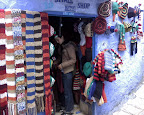 caricature, replete with the cloud of aromatic blue smoke. His knitwear was fascinating and priced so fairly I had trouble carrying out the ritualistic bargaining. Back at the hotel’s family room we found a group of men getting high and playing music. We opted to sit in, though we abstained from participating in anything but drinking tea. The hotel’s owner was an interesting Italian chap whose vibe is best summed up as a little weird. Lots of young male help, all getting high; the picture was simply disconcerting.
caricature, replete with the cloud of aromatic blue smoke. His knitwear was fascinating and priced so fairly I had trouble carrying out the ritualistic bargaining. Back at the hotel’s family room we found a group of men getting high and playing music. We opted to sit in, though we abstained from participating in anything but drinking tea. The hotel’s owner was an interesting Italian chap whose vibe is best summed up as a little weird. Lots of young male help, all getting high; the picture was simply disconcerting. 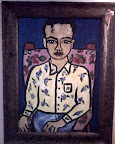 i driver finally arrived but wanted double what the hotelier’s “son” had quoted me. It was all a very shady ordeal—the hotelier got defensive rather than apologetic, insisting on the higher price. I would have been negotiating for a taxi or searching for a bus hours earlier had I not been misled to wait for the crooked taxi. Alas, on our walk over to the taxi stand, the shady driver offered a discount, and desperate (now a theme), I accepted.
i driver finally arrived but wanted double what the hotelier’s “son” had quoted me. It was all a very shady ordeal—the hotelier got defensive rather than apologetic, insisting on the higher price. I would have been negotiating for a taxi or searching for a bus hours earlier had I not been misled to wait for the crooked taxi. Alas, on our walk over to the taxi stand, the shady driver offered a discount, and desperate (now a theme), I accepted. 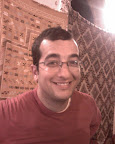 Nacer met us as we arrived at Tangiers and helped us lug our luggage up to his fifth (European=American sixth) floor walkup before a quick tour through town. The traffic in Tangiers was about as time-consuming as the drive from Chaouen. He handed us off to his friend Marouane who generously accompanied us and kept us out of trouble until we left for dinner at Nacer’s hotel. The thing is, apropos this approaching hospitality moment, is that I would rather have eaten elsewhere. I knew this even before I saw the menu (actually, it was a buffet). I agreed to the meal for the same reason I agreed to stay in Nacer’s apartment—for the magic Moroccan idea of hospitality. For the same reason they all need to give, I have almost come to feel it my duty to accept. It was not good enough for Nacer to give us a few recommendations or to hang out for a while—he needed to host us and make us feel a sense of welcome that is alien back home. So I was only slightly surprised when the manager informed me that our meal had been completely paid for by Nacer.
Nacer met us as we arrived at Tangiers and helped us lug our luggage up to his fifth (European=American sixth) floor walkup before a quick tour through town. The traffic in Tangiers was about as time-consuming as the drive from Chaouen. He handed us off to his friend Marouane who generously accompanied us and kept us out of trouble until we left for dinner at Nacer’s hotel. The thing is, apropos this approaching hospitality moment, is that I would rather have eaten elsewhere. I knew this even before I saw the menu (actually, it was a buffet). I agreed to the meal for the same reason I agreed to stay in Nacer’s apartment—for the magic Moroccan idea of hospitality. For the same reason they all need to give, I have almost come to feel it my duty to accept. It was not good enough for Nacer to give us a few recommendations or to hang out for a while—he needed to host us and make us feel a sense of welcome that is alien back home. So I was only slightly surprised when the manager informed me that our meal had been completely paid for by Nacer.


